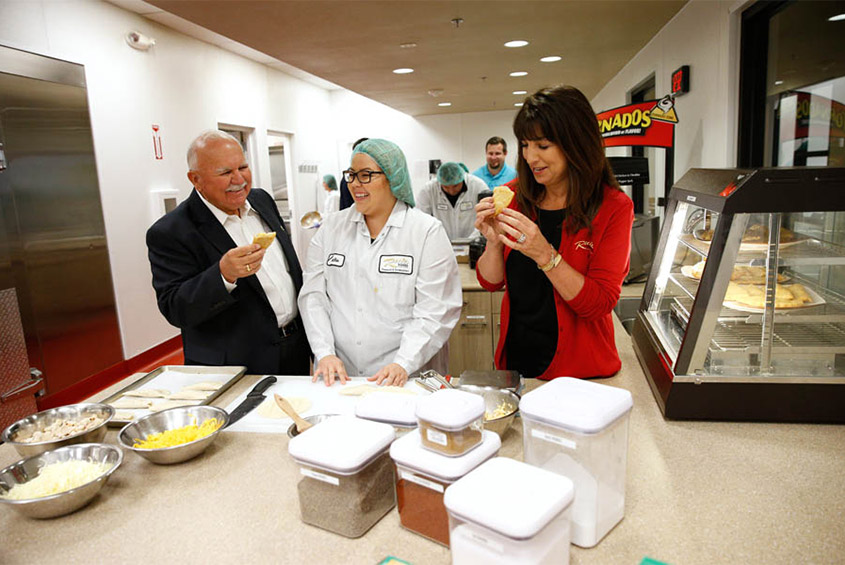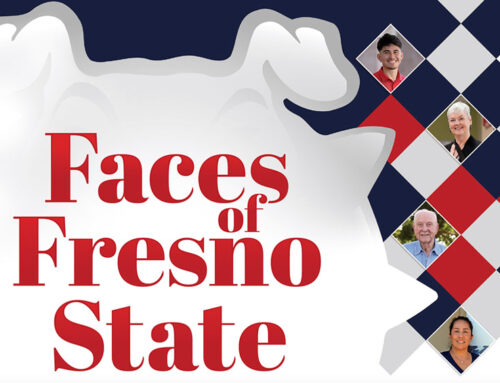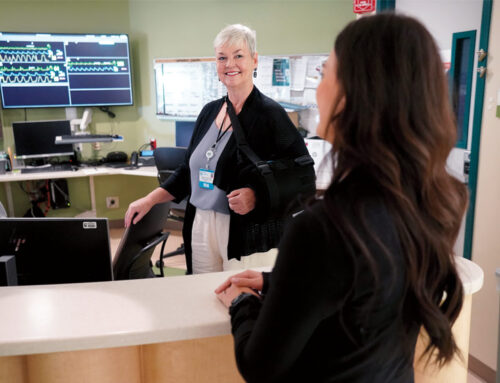Open for Generations
Family businesses are driving the economy while evolving with each generation
Story by Eddie Hughes
Photos by Cary Edmondson
John and James Rosetta’s parents immigrated to the United States from Italy in the 1920s in search of a better life for their family. It was a well executed idea — until tragedy struck. The boys’ mother died shortly after the move, leaving them with nowhere to go but to foster care. John and James overcame their less-than-ideal circumstances, and both ended up joining the military and fighting in World War II — John in the Air Force and James in the Army.
Upon returning home from the war, John got a job as a janitor at Fresno Agricultural Works and worked his way up. He worked hard. He saved money. He took meticulous mental notes on every aspect of running the business. And eight years later, in 1956, he bought it. With his brother as co-owner, it became what’s known today as one of the most iconic mom-and-pop businesses in the Valley — Fresno Ag Hardware.
 It’s the American dream — the belief that all people are created equal and have the ability to prosper with upward social mobility. Few things illustrate the American dream as poignantly as a family-run business.
It’s the American dream — the belief that all people are created equal and have the ability to prosper with upward social mobility. Few things illustrate the American dream as poignantly as a family-run business.
“Probably the most important thing I can tell people about Fresno Ag is my grandfather John Rosetta’s story and the American dream,” says Ian Williams,
a 27-year-old, 2016 Fresno State graduate who is being groomed to run the business. That transition period and development of future leaders, from generation to generation or from one family to the next, is critical to keeping business healthy.
John died in 2003 and James died in 2015. Today, Fresno Ag is owned by Rae Rosetta, John’s widow. Their daughter, Michelle Williams, is the office manager. Ian is next in line. And he’s already helping the business adjust and respond to expectations of a new generation of customers.
Family-owned or controlled businesses make up about 90 percent of all United States companies, according to a study by Cornell University.
And while every family business has its own, unique start-up story, there is a movement picking up momentum in the Central Valley and across the country to ensure these businesses remain viable and transition smoothly from generation to generation.
A report by the University of Southern Maine shows family businesses generate about half of the country’s Gross National Product, 60 percent of the country’s employment and 78 percent of all new job creation. Suffice it to say, family businesses are critical to the economy.
A Support Network for Family Business
Since 1989, the Institute for Family Business at Fresno State has served as a resource providing Central Valley businesses an opportunity to gather and discuss issues, share strategies and learn from those who have faced similar challenges. The institute hosts educational gatherings every four to six weeks that are free to members. Its mission is to support, serve and sustain family businesses.
“Family business is at the heart of our country and the backbone of our national economy,” says Jane Olvera Quebe, president of JP Marketing and board chair of the institute. “If you look around the Central Valley, you will find family businesses of all shapes and sizes that keep our economy going, particularly in agriculture but also in manufacturing, light industrial, food production and distribution, retail, dining and more.”
The institute, housed in the Craig School of Business at Fresno State, is one of few remaining in California. Ten years ago, there were eight similar institutes associated with colleges and universities in the state. Today there are only three — at Fresno State, the University of the Pacific and California State University, Fullerton.
Much of the reason for the decline is related to the recession, Quebe says. “Unfortunately, not only did it become difficult for colleges and universities to support these organizations, but also many family businesses were unable to support or even sustain through 2009 and 2010, which dramatically impacted the financial support and memberships across the state.”
Fresno State’s institute has about 50 member businesses, including family firms and those that support family firms, and is in the midst of a $1 million endowment campaign to ensure the future of this community resource.
In January, Fred and Mitzie Ruiz of Ruiz Foods pledged $125,000 to launch the campaign. Fred Ruiz was a founding member of the institute and has an American dream story of his own.
“If you look around the Central Valley, you will find family businesses of all shapes and sizes that keep our economy going, particularly in agriculture but also in manufacturing, light industrial, food production and distribution, retail, dining and more.” Jane Olvera Quebe, President, JP MARKETING
Transitioning to the Next Generation
Ruiz Foods was co-founded in Tulare by Fred Ruiz and his father, Louis, in 1964. They began making enchiladas and burritos using recipes from Fred’s mother. Fred was in charge of production and Louis was in charge of sales and delivery.
Today, with manufacturing facilities in Central California, Texas and South Carolina and more than 3,000 employees, Ruiz Foods’ El Monterey brand is the No. 1 selling frozen Mexican food product and is sold in 94 percent of all grocery stores in the United States.
Maybe most important for its future success, the business successfully transitioned to its third generation with Kim Ruiz Beck (Fred’s daughter and a 1987 Fresno State graduate) serving as chairman and helping the company adjust to food trends and evolving technology.
The company opened a new customer base with its creation of the Tornados brand, a popular roller grill snack sold in United States convenience stores.
“Much has changed over 52 years for Ruiz Foods,” says Ruiz Beck. “With a focus on the past 10 years, the popularity of Mexican food continues to grow, and we’ve opened two large, additional manufacturing facilities using the latest automation technology. We’re competing for share of stomach while keeping a close eye on evolving tastes and preferences.”
The transition to the third generation of family went smoothly for Ruiz Foods, and it helped to have a network of experienced business owners with whom to share ideas. “We’ve been lucky enough to have very prominent Central Valley families share their generational succession stories with us,” Quebe says, “and you realize that beating the odds and successfully passing your family business from one generation to the next is doable.”
The Institute for Family Business provides a forum for exchanging ideas, research findings, academic courses and information that is unique to family firms, like succession planning and grooming the next generation of business leaders. “What members tell us is of most value is the opportunity to network with other like-minded family businesses who are experiencing similar challenges,” Quebe says.
In 2017, the institute will launch a Next Generation Retreat for those who recently took charge of their company or are in the succession planning stages. Dr. Robert Harper, dean of the Craig School of Business, says it’s critical that family businesses continue to thrive because they’re the biggest economic driver in the region.
“I have learned something useful at every meeting I have attended,” says Roy Oken, president of Wonder Valley Ranch Resort in Sanger. “We were able to avoid making mistakes by listening to others who have gone through our same obstacles. It is much easier and less expensive to learn from others than to make the mistakes yourself.”
Keeping the American Dream Alive

With the next generation of business leaders, comes the next generation of technology. And technology, no matter who is asked, seems to be at the forefront of the evolution of family business. There are full-time jobs and job duties today that didn’t exist a decade or two ago.
At 90 years old, Dr. Richard A. Johanson has seen his family’s freight brokerage firm transform from a staff of three in a rented space at a local truck stop in 1971 to about 90 employees headquartered in Fresno and spread over five other offices in Sacramento, Oregon, Wisconsin and New Jersey. Six of those employees are devoted solely to ensuring that Johanson Transportation Service is using leading-edge information technology systems.
“In 1971, most transactions took place via telephone with the required paperwork following,” Richard Johanson says. “Today, modern technology has made the use of paper and pencil obsolete.”
Johanson Transportation Service, which won the 2011 California Family Business Award presented by the institute, provides freight solutions by truck, ocean, air or rail. The truckload division alone fulfills up to 35,000 orders a year.
“The whole platform we’ve built our business around is structured around IT,” says Larry Johanson, president and CEO and son of Richard. “We’ve custom written every piece of it ourselves. We have a Transportation Management System that allows customers to make a selection based on price and manage their freight with visibility to see where their shipment is at any given time.”
Larry Johanson, a 1976 Fresno State graduate, says the family recognized years ago they could no longer do business in the 21st century the way they did it in the 1980s and 1990s. “With the volume of freight we move now, there would be no way we could do it without that technology.”
Fresno Ag Hardware, a 2011 finalist for the California Family Business Award, also has adjusted to a vastly different way of doing business with new technology. Just over a decade ago, the store was using hand-written receipts. Now Fresno Ag is scanning QR codes, sending out email blasts and maintaining an active social media presence. The one constant has been the store’s focus on providing personalized customer service and responding to community feedback. It’s what Fresno Ag calls the “amazing experience.”
That personal touch seems to go hand-in-hand with many successful family businesses. “My dad had a vision for starting a company,” Larry Johanson says, “and he wrote out the cornerstones of what we were going to stand for — experience, integrity, gratitude and respect. How we do business changes, but how we’re going to operate fundamentally has never changed.”
For the next generation — and the one after that — new challenges and issues will steadily arise. But as long as the entrepreneurial spirit is alive in young people across the Central Valley and beyond, and there are resources and tools in place, family businesses can continue to thrive and drive a healthy economy.
“I grew up in the store, and I’ve been coming here my whole life. It hasn’t always been my dream,” says Ian Williams, who started working in the Fresno Ag Hardware warehouse at age 16 but briefly moved out of town to pursue other interests. “When I was living in Tahoe, I realized I was giving up an opportunity, and I’d hate to squander what my grandfather had built.
“Hard work pays off in America. As long as you’re able to work you can achieve your dreams. It’s not a myth. I’ve seen it first-hand.”
— Eddie Hughes is senior editor for FresnoState Magazine.
Family businesses are responsible for:
A $1 million fundraising campaign is underway to endow the Institute for Family Business and ensure it as a resource that’s here to stay. The fund will allow for:
- Dedicated director of the Institute for Family Business
- Online learning hub
- National Family Business Conference hosted at Fresno State
- Academic and industry research
- Next Generation Retreat, networking and professional development
- Scholarships for students involved in family businesses
“Fresno State works hard to raise monies to grow classrooms and equipment to be able to assist more students and to help those students learn and grow. This is a win-win for everyone — the community, the students and the family-owned businesses.” Fred Ruiz, co-founder of Ruiz Foods
For information on how to get involved, visit www.FresnoState.edu/craig/ifb







